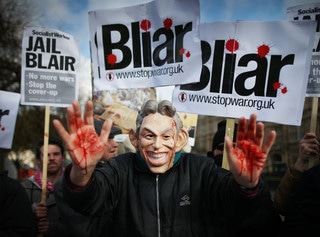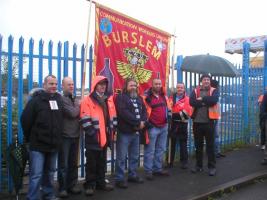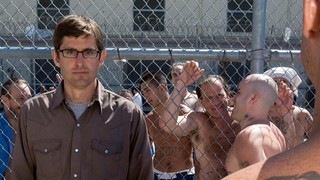Though I haven't been associated with the
Communist Party of Great Britain (Provisional Central Committee/
Weekly Worker) for over three years, I still occasionally get comrades, including a few leading
Socialist Party cadre, who are only too keen to ask me about my time as a member and supporter. Sadly, left watchers and gossipmongers will be disappointed to learn I know nothing about the alleged
Sketchleys connection, property portfolios, the
INLA relationship, and input from Turkish dissidents. I wasn't a particularly active comrade, you see. My sum contribution to the cpgb consisted of turning out as voting fodder at a few
Socialist Alliance meets, selling the
WW at my local
Stop the War group, arguing for the cpgb's general political approach on the
UK Left Network, and writing the regular
Around the Web column for almost two years.
For such a small group, the cpgb is a presence on the British far left most activists have to come to grips with at some point. Because the
WW massively bends the stick in the direction of reporting almost every argument and significant development on the left, it quickly became a must-read paper, like it or hate it. A lot of the time, mountains are often made out of mole hills, mad predictions made about the doom of other left wing organisations, and articles are written in such a way almost guaranteed to get the backs up of other lefts. Generally, it's not noted for its high degree of accuracy. One particular set of examples were the gloomy predictions the cpgb forecast concerning the SP in the late 90s and early 00s. Readers were told the party was in crisis, and the political graveyard beckoned. There is a bit of truth to this - in that period the small short-lived
Socialist Democracy Group upped sticks, as did a chunk of former cadre in Liverpool (who became the Merseyside Socialists), the majority of the
Scottish organisation left the
CWI, and there were splits in Pakistan and the USA. But, the
WW claimed, a more serious split was brewing between Dave Nellist and the leadership over the SA, and oblivion loomed. However, evidence for such a split amounted to nothing more than brother Nellist and the Coventry comrades appearing (from the outside) to be more enthusiastic and hands-on with the SA than the rest of the organisation. This foray into Mystic Meg territory came to naught, and far from going into terminal crisis the SP has largely recovered from the experience and remains very much alive.
The big problem I have with the cpgb comes down to a question of orientation. If they want to concentrate their energies on recruiting other leftists, then fine. But this comes at the price of having an indirect relationship to the class, effectively insulating the cpgb as an organisation. In practice, the only grounding their politics have are as responses to what they perceive as deficiencies of the wider left rather than what might attract working class people to socialist ideas. This at times can assume quite comic forms. For example, long-time
WW readers might recall the long-running dispute between it and the
Alliance for Workers' Liberty. On paper, there was much to commend a fusion. They have similar internal regimes and attitudes to open political debate. Their views on the Soviet Union were not dissimilar, and they weren't a million miles away from each other's critique of the left's standard issue anti-imperialism. And yet could either groups discuss their differences rationally? Definitely not. The narcissism of small differences came very much into play and not for a million years would you believe these are organisations were talking about uniting! We've all seen classic front page headlines like
'Bush's 'Troop Surge' Deepens US Ruling Class Divisions. But AWL Still Won't Demand Withdrawal'. However, the intensity of their exchanges peaked some five years ago, over a thinly-attended public meeting in Leeds. The cpgb had recruited a lefty vicar, the Rev. Ray Gaston. He organised a public meeting and invited along
Mike Marqusee, then of the SA and Stop the War, and the AWL's guru, Sean Matgamna to debate the issue of Marxism and religion. When comrade Marqusee found out who he was sharing the platform with, he objected on the grounds he didn't fancy being abused as an anti-semite for daring to criticise Zionism and Israel. The good reverend then left a message on Matgamna's answer phone, contacted the local AWL group, and arranged for the cpgb's Jack Conrad to step up to the plate. Unfortunately, something got lost in translation. Matgamna turned up and sat sullen and silent in the audience. Now, how should this have been dealt with? Should Matgamna have politely but firmly registered his displeasure? Should, on behalf of the cpgb, Jack Conrad have apologised for the mix up? Yes. So what happened? Months and months and months of tedious polemic in the
WW's pages and on the AWL website. Matgamna alleged there was some cpgb conspiracy preventing him from addressing the massed ranks of Ray Gaston's congregation. Conrad in turn dug his heels in and refused, as a point of principle, to apologise for the mistake. In all, it was a ridiculous farce. Both sides acted like spoiled brats and, in my eyes, seriously damaged eithers' claims to be serious working class organisations. It helped put me on an exit trajectory out of the cpgb.
All this said, my association with the cpgb spanned about six years (I continued
Around the Web 18 months after I left, in April 2003), and it was bound to leave some impression upon my understanding of Marxism and revolutionary politics. And it has. For starters, I went into the cpgb as a fairly orthodox Trot regarding my politics, particularly on the Soviet Union. But through reading their material, including the "unconsciously" Trotskyist
From October to August (which is one of the best Marxist analyses I've read on the road from Gorbachev to Yeltsin), I came to the conclusion the USSR and other "socialist" countries could not be workers' states. This is not to say they didn't have some progressive features worth defending, but the conflation of "proletarian property forms" (in reality, legal fictions) with "proletarian property relations" is a mistake and one Marxists shouldn't really make. The cpgb position, which was more a point of departure for further analysis than a neatly rounded out category, was these social formations were neither capitalist or socialist, and belonged to those species of societies - such as European absolutism, the Andean mode of production, etc. who proved not to be viable in the long term.
Then there is the analysis of
New Labour's project to remould and "modernise" the British state. Drawing heavily on
Steve Freeman's ideas around the 'social monarchy', the cpgb argued that as Thatcher attacked the Keynesian compromise underpinning British capitalism in the 1945-79, the limited stake the British working class had in the state was severely undermined, and hence its loyalty to the UK was put into question. Blair's constitutional project was aimed to strengthen the union by granting Scotland a limited parliament and Wales an Assembly to head off nationalist discontent. Other projects like House of Lords reform, introduction of proportional representation to non-Westminster elections, (aborted) regional devolution, presidential mayors, and the London Assembly can be seen in the same light. The monarchy has had a bit of a makeover too. Fewer royals leech off the civil list, they pay taxes, the rules of succession changed (the next in line to the thrown is now the eldest child, irrespective of gender), and so on. The cpgb argued the left as a whole needs to take constitutional issues more seriously and develop an alternative programme that maximises political democracy under capitalism in a bid to weaken the state and help empower our class. This seems reasonable to me.
Another positive in my view is the open approach they take to differences between revolutionaries. Some comrades believe this gives the cpgb carte blanche to muckrake, but nonetheless the
WW has helped facilitate debate of issues, even ones that are controversial by left standards. In my opinion the left should generally be open and honest about its internal differences and allow more open debate in the pages of its press. After all, inviting readers to submit their thoughts means they're engaging with the contents of our papers, and could draw them closer to our orbit. But unfortunately the sad truth is most bourgeois papers operate more open editorial policies. Local rags, the "quality" press, and even tabloids allow debates on their letters pages. As socialism is more democratic than anything capitalism can muster, isn't it high time our press reflected that?
Finally, there is another critique of a central plank of Trotskyist orthodoxy. The first line of Trotsky's
Transitional Programme reads "The world political situation as a whole is chiefly characterised by a historical crisis of the leadership of the proletariat." I couldn't tell you how many times I've heard this repeated over the years. Problem is, it was a questionable conclusion when Trotsky wrote it in 1938, and is doubly absurd for 21st century Britain. The implication behind the phrase is the working class is out there champing at the bit and ready to strike capital its deathblow. All that stands in its way are the parties of social democracy, the leadership of the trade union movement, and of course, revolutionaries who happen to be in other socialist groups. If these are brushed aside the masses can be won to the revolutionary programme and hey presto! Job done. I don't want to sound facetious: this isn't to say the issue of leadership isn't a problem - for example, if several trade union leaders declared their support for a new party and moved to set one up, it would act as a rallying point for class conscious workers fed up with New Labour. But it would only constitute a starting point, there will be no stampede of hundreds of thousands to join and unions queuing up to affiliate. Why? Because the working class itself is in crisis. The defeats of the Thatcher years, the structural shift to a neoliberal labour market, the individuating effects of consumerism and the media, and the absence of a coherent, independent working class political voice has given us a working class much more atomised, fluctuating, fragmented, and insecure than that of 25 years ago. To be fair, the left on the whole has not allowed a bad theory to get in the way of recognising this basic fact of revolutionary political life. For instance, you could say the SP's hallmark is its ability to relate socialist politics to workers of varying levels of political understanding, but there is a gap between the correct practice and the faulty theoretical perspective. Ironically, the cpgb gets it the other way round. It has elaborated this perspective on a theoretical level but it still puts forward ultra-left slogans and positions out of sync with the thinking of the overwhelming majority of working class people. They have a formally correct understanding but, because of their self-imposed isolation from the class, are unable to follow through and have to fall back on posture politics.
So, the cpgb does have some useful things to say and they do possess a team of commentators who can be quite perceptive at times. But what of the cpgb's prospects? Let me tell you a little story. Back in the late 90s and early 00s, it built quite a reasonable profile as being one of the keenest, if not the most enthusiastic participant in the SA. It was starting to attract a number of independents into its orbit and overall made a positive contribution to the cause of left unity. Even the
SWP leadership were saying nice things about the
WW. They looked like the small ultra-left group most likely to succeed. But they didn't. Comrades who joined tended to drift again after a couple of years (none of the comrades who signed up roughly the same time as me are still around), and then a further round of newer recruits were shed when the cpgb prevaricated over the forming of and participation in
Respect. Now though, judging by interventions at left meetings, the launching of
Communist Students, and their leading role in pulling
Hands Off the People of Iran together, they find themselves in a position not dissimilar to that in 1999-2001. They have recovered numbers, are not just based in London anymore, and appear to have gained a new degree of self confidence. But whether they will grow or not depends on learning the lessons of the SA and Respect interventions. If they are to become sizeable it requires a big shift away from the traditional practice of just speaking in and reporting on left meetings. This means seeing HOPI as an opportunity to engage with wider layers and new audiences, and not just an opportunity to bash the SWP and Stop the War. If they don't, the newer layer of comrades will be shed and the cpgb will continue to be seen as that rather eccentric group of lefty trainspotters.







